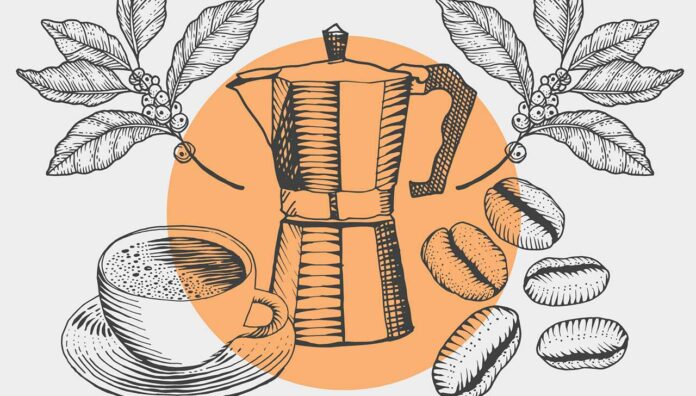It’s effective, cheap, legal and relatively safe. Caffeine is the most widely consumed psychoactive drug in the world.*
At an estimated 2.25 billion daily cups of coffee alone, there is little argument with the claim that people consume more caffeine globally than any other psychoactive drug.1–6,10 Further, caffeine is a component of other popular drinks and foods. Among them, tea and chocolate, not to mention kola nuts, guarana seeds and more than 60 other plants.4,5
Humans have been getting a kick-start from caffeine since our earliest days, and from coffee, specifically, for millennia.4,6 Coffee (Coffea arabica) is a hardy plant originating in Ethiopia. The Persian physician Rhazes (c. 865–925 AD) was the first to spruik its benefits. His assessment: ‘hot and dry and very good for the stomach’.4,6,7
By the 15th century, the use of coffee as a stimulant had spread throughout the Middle East. Coffee houses opened across the Arab world. By the 18th century, Europeans had picked up the habit, and during the 19th century, German chemists isolated then synthesised caffeine. They laid the foundation of today’s thriving caffeine industry by increasing the sources, production, diversity, and availability of products.4,6,8,9
Caffeine today
Like previous generations, most people today consume caffeine to increase alertness, elevate mood, improve physical performance, and reduce drowsiness and fatigue.2,4,6 Little wonder then that consumption continues to rise.2
What are the risks?
Some people are more vulnerable than others to caffeine’s negative effects. Among them are pregnant and nursing women, children, adolescents and young adults, as well as those with underlying health conditions. They may experience impaired sleep and cardiovascular function, along with increased harm from smoking and drinking alcohol.2
Thanks primarily to the plethora of affordable caffeine-enhanced products, caffeine abuse and dependence are increasing. The consequence can be ‘caffeine intoxication’, which in turn boosts the risk of premature and unnatural death.4
‘Caffeine withdrawal syndrome’ is another downside of over-dependence on caffeine. Depending on their daily dose, caffeine fans facing abrupt withdrawal may experience distressing symptoms, from headaches, fatigue, decreased energy and alertness, to depression, irritability and more. The message: reduce consumption gradually.10
What are the benefits?
Fortunately, for healthy people the caffeine in food and beverages is ‘relatively safe’.2 It even has significant health benefits,1,3,4,11–14 numerous reports suggest.
Decreased mortality tops the list.11 A 2019 meta-analysis of 40 studies found 2–4 cups of coffee daily was associated with ‘inverse associations’ with mortality from all-causes, cardiovascular disease and cancers.11
Other findings indicate caffeine lowers risks associated with liver cancer,12 suicide,3,14 type 2 diabetes and Parkinson’s disease.1,4 Caffeine consumption also reduces neurological disorders and enhances long-term memory.2,4,13 It even contains health-promoting nutrients.1
How it works
Caffeine is a central nervous system stimulant. Its primary impact is blocking all four subtypes of adenosine receptors in the brain, especially A2A, which is responsible for wakefulness.2,4,5,7
Regulation
In Australia it’s legal to buy and sell caffeine. Adding it to foods and drinks, however, is regulated by the Australia New Zealand Food Standards Code.6
Conflict of interest
* This column was written with the assistance of caffeine
References
- Nordqvist J. Health benefits and risks of drinking coffee. Medical News Today. 2019.
- Temple JL, Bernard C, Lipshultz SE, et al. The safety of ingested caffeine: a comprehensive review. Front Psychiatry 2017;8(80).
- Park H, Suh BS, Lee K. Relationship between daily coffee intake and suicidal ideation. J Affect Disord 2019;(256):468–472.
- Cappelletti S, Piacentino D, Sani G, Aromatario M. Caffeine: cognitive and physical performance enhancer or psychoactive drug? Curr Neuropharmacol 2015;13(1):71–88.
- Evans J, Richards JR, Battisti AS. Caffeine. StatPearls [Internet]. StatPearls Publishing 2021.
- Drug Info. State Library New South Wales. Caffeine. 2018.
- Edo Barista. Rhazes and the therapeutic use of coffee in Ancient Persia. 2016.
- Wong S. Friedlieb Ferdinand Runge, the godfather of caffeine. New Scientist. Physics. 2019.
- Nobel Prize Outreach. NobelPrize.org. Emil Fischer – Biographical. 2021.
- Sajadi-Ernazarova KR, Anderson J, Dhakal A, et al. Caffeine withdrawal. StatPearls [Internet]. StatPearls Publishing 2021.
- Kim Y, Je Y, Giovannucci E. Coffee consumption and all-cause and cause-specific mortality: a meta-analysis by potential modifiers. Eur J Epidemiol 2019;34(8):731–752.
- Inoue M, Tsugane S. Coffee drinking and reduced risk of liver cancer: update on epidemiological findings and potential mechanisms. Curr Nutr Rep 2019;8(3):182–186.
- Borota D, Murray E, Keceli G, et al.Post-study caffeine administration enhances memory consolidation in humans. Nat Neurosci 2014;17:201–203.
- Lucas M, O’Reilly EJ, Pan A, et al. Coffee, caffeine, and risk of completed suicide: results from three prospective cohorts of American adults. World J Biol Psychiatry 2014;15(5):377–386.



 Dr Peter Tenni[/caption]
Dr Peter Tenni[/caption]
 How should we deprescribe gabapentinoids, according to the Maudsley Deprescribing Guidelines[/caption]
How should we deprescribe gabapentinoids, according to the Maudsley Deprescribing Guidelines[/caption]



 Pharmacists have always prescribed, but they have the potential to prescribe much more
Pharmacists have always prescribed, but they have the potential to prescribe much more





